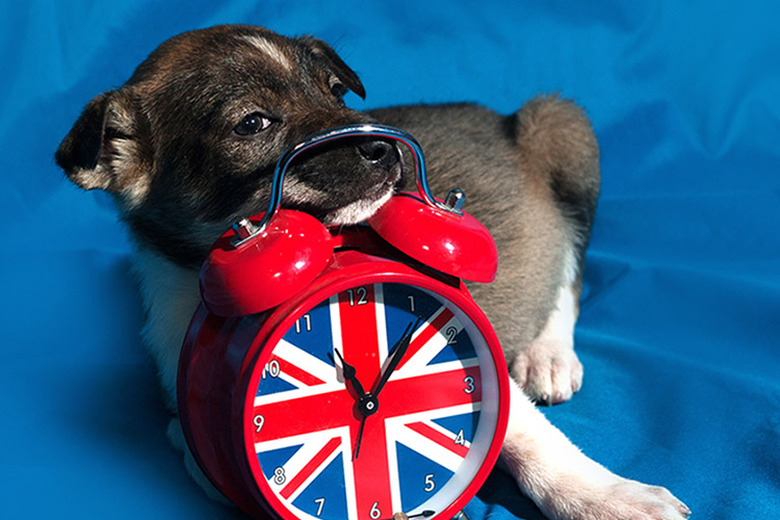Does A Ticking Clock Help A Puppy Sleep?
If your recently adopted puppy whines and cries throughout the night, you may be wondering where the "off" button is. You can't blame your poor puppy though; being in a new home is stressful and he may miss his mom and siblings. However, everyday items like a ticking clock and water bottle, plus a few tips may come to your aid.
Understanding Puppy Stress
Moving into a new home is a stressful event for most pups. Imagine being exposed to new sights, smells and sounds and then having to deal with people you've never met before crowding around you and handling you at every turn. Add to that missing your mom, brothers and sisters and you have the perfect recipe for a stressed pup who will manifest his unhappiness through cries, whines and barks.
Preventing Puppy Stress
Your new puppy needs some time to adjust to his new home and new routines. Keep your puppy confined to a puppy-proofed room instead of giving him an all-access pass. While you may be eager to invite all your family and friends over to look at your pup, it's best to wait a few days when the puppy is more relaxed. Plug-in diffusers and collars containing the synthetic version of dog-appeasing pheromones may be helpful in comforting stressed pups.
Reducing Home Sickness
Many breeders will provide new puppy owners a blanket or toy that has the smell of home to take along. Make sure your puppy has access to that so he can feel reassured and less lonely. The peak time for feeling homesick is at night when the home gets dark and quiet and the puppy feels alone. In this case, a ticking clock and a hot water bottle wrapped in a blanket may have an effective, soothing effect.
Providing Mama Substitutes
The warmth of the water bottle will mimic the warmth produced by the pup's mom and siblings. Because your puppy possibly never slept alone, the water bottle will help him feel comfortable so he can fall asleep. The ticking clock, on the other hand, will help mimic his mother's heartbeat. Put together, both of these measures may have a reassuring effect on your pup who may enjoy a sense of familiarity in an unfamiliar place.
Decreasing Loneliness
While effective, a warm bottle and ticking clock may not always be enough. The first few nights, it doesn't hurt to have the pup sleep in your bedroom on his doggie bed or inside his crate so he won't feel alone. Giving him a food-stuffed toy may help him associate nighttime with good things and help soothe himself to sleep. Should he whine, make sure he doesn't have to go potty, needs water or is hungry, wet or cold. If all his needs are met, you can then talk to him softly and stroke him a bit, but just don't overdo it or you'll train him to whine for attention, warns veterinarian, animal behaviorist and dog trainer Ian Dunbar in his book Before You Get Your Puppy"
By Adrienne Farricelli
References
Before You Get Your Puppy; Ian Dunbar
Teaching Puppies: How to Stop Your Puppy Crying at Night
Pet MD: Surviving the First Night with Your Puppy
Pet MD: Surviving the First Night with Your Puppy
Dog Time: First Day Home
Veterinary Record: Efficacy of Dog-Appeasing Pheromone in Reducing Stress Associated with Social Isolation in Newly Adopted Puppies
About the Author
Adrienne Farricelli has been writing for magazines, books and online publications since 2005. She specializes in canine topics, previously working for the American Animal Hospital Association and receiving certification from the Certification Council for Professional Dog Trainers. Her articles have appeared in "USA Today," "The APDT Chronicle of the Dog" and "Every Dog Magazine." She also contributed a chapter in the book " Puppy Socialization – An Insider's Guide to Dog Behavioral Fitness" by Caryl Wolff.
